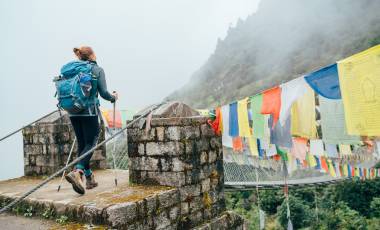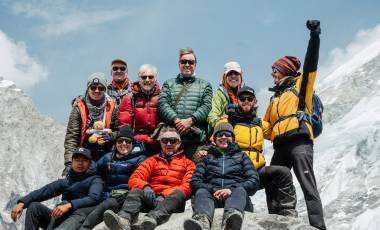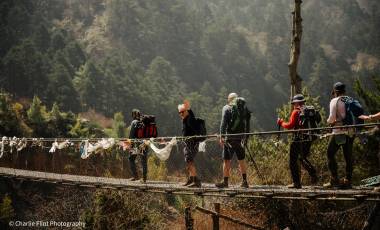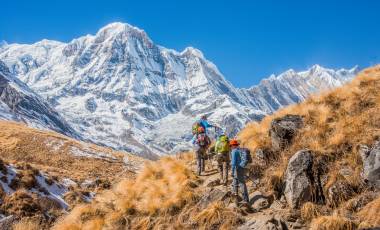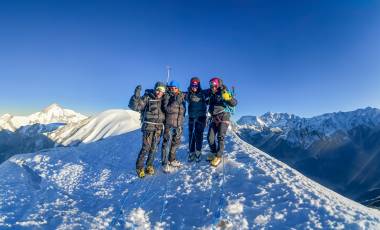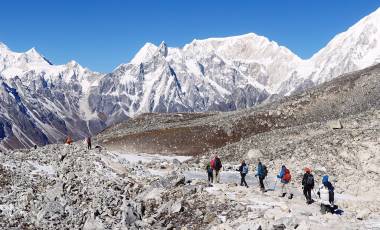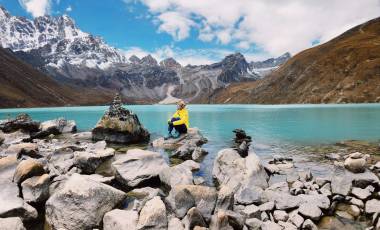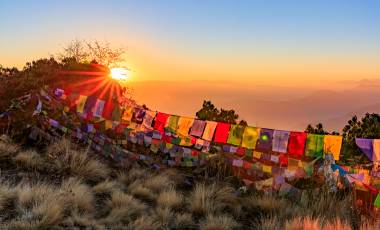Absolutely amazing trip from start to finish. Met at the airport by a smiling Tenzi Sherpa, couldn’t have had a more welcoming greeting. Thorough briefing before an early start off into the mountains. Kept fully informed all the way along the trek. Always kept upbeat by Tenzis ready smile and laugh.
Stunning scenery and totally awe inspiring to walk among the highest mountains in the world.
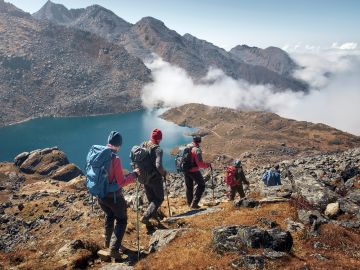
Trekking in Nepal
Our Best Nepal Trekking Tours

Top 5 Reasons to Trek Nepal with Exodus
1. Experience
With over 40 years’ experience operating treks in Nepal, we’re industry leaders. We use that experience to meticulously design our Nepal trekking tours to offer the perfect balance of adventure, culture, and breathtaking scenery. We have worked with our family-run local operator for two generations to lead you through iconic trails like Everest Base Camp and Annapurna, ensuring every step is filled with discovery and wonder. Our in-house experts have also created a Nepal Destination Guide, channeling their vast experience in the region to answer your questions and help you prepare for your Himalayan trek.
2.Safety
Your safety is paramount to us. We offer one of the highest guide-to-client ratios of any Nepal trekking tours, with at least one member of staff to four clients. We conduct regular safety assessments, provide top-of-the-line equipment, and employ experienced guides trained in emergency response. On high-altitude treks, we carry Portable Altitude Chambers – known as PAC bags – to treat altitude sickness, if needed. Your safety is our utmost concern, and we take every measure to ensure a secure and worry-free trekking experience in the Himalayas.
3.Quality
From the moment you book your Nepal adventure with Exodus, our dedicated team is here to ensure every aspect of your journey is seamless and stress-free. From pre-trip preparations to on-the-ground assistance, we go above and beyond to provide unparalleled support, allowing you to focus on the magic of the mountains. Our knowledgeable guides and impressive standard of tea houses, camping equipment and food have won each of our Everest treks a rating of 4.5 stars or above.
4.Valued Guides
We have some of the most exceptional and experienced guides in Nepal, many of whom have been working with us for 20 years or more. Our guides are passionate about sharing their knowledge and love for Nepal. With their expertise, you’ll gain deeper insights into the region’s history, traditions, and natural wonders, enriching your trekking experience with unforgettable stories and meaningful interactions.
5.Responsible Tourism
As pioneers in sustainable and responsible tourism, Exodus is committed to minimizing our environmental impact and supporting local communities. Our Nepal trekking trips adhere to strict eco-friendly practices, promoting conservation efforts and contributing to the well-being of local people along the way. Our projects include the installation of over 50 solar cookers in tea houses and villages, as well as support of the Nava Kiran orphanage in Kathmandu and the Esther Benjamins Trust.
Stephanie Tugwell Everest Base Camp Trek
Jim Studer Annapurna CircuitAn incredible trek during a less crowded time. Drier and cooler at this time of the year though (crossing the pass we started at -5F).
How physically fit do I need to be to complete the trek?
We offer a variety of treks in Nepal. Check the activity rating of the tour prior to booking and review your trip notes for details on trekking distances and altitude gains and use this as a reference on how to prepare. A good level of fitness is recommended for trekking in Nepal, as many of our tours in this region involve long days of walking and altitude gains. Trekkers should be prepared for physical exertion and be able to walk for several hours each day. For more details on how to prepare, check your trip notes and our fitness guide.
What gear and equipment do I need to bring for the trek?
Appropriate footwear and sun protection are essential on all Nepal treks. Additionally, duffle bags or soft kit bags are required for the porters to carry on many of our treks, and there are often weight limits in place for the regional flights. Check your trip notes and, if embarking on an Everest trip, review our Everest Region Kit List for more detailed and specific packing information. By ensuring you have the necessary gear and equipment and following packing guidelines, you’ll be well-prepared to embark on the unforgettable journey to Nepal while staying comfortable and safe throughout the trek.
FAQs on Trekking in Nepal
Exodus has been operating trekking tours in Nepal for over 30 years, providing trekkers with a wealth of experience and expertise. Our award-winning team of local guides is handpicked for their extensive knowledge of the trails, ensuring a safe and enjoyable trekking experience. Each guide is not only qualified in first aid but also undergoes rigorous training to recognize and manage symptoms of altitude sickness, a common concern when trekking at high elevations.
Each guide’s deep understanding of the terrain, weather patterns, and local customs enhances the overall journey, allowing trekkers to immerse themselves fully in the adventure while feeling confident in their guides’ abilities. Whether navigating challenging mountain passes or sharing insights into the region’s culture and history, our guides are dedicated to providing trekkers with an unforgettable and enriching experience in the Himalayas.
Accommodations along the trekking routes are typically basic tea houses or lodges, usually offering shared sleeping quarters and communal dining areas. Amenities may vary, but they provide a comfortable resting place after a day of trekking, and often offer stunning mountain views and provide an authentic local experience. Check your trip notes for more details on your specific tour and departure.
The best time for trekking in Nepal is during the spring (March to May) and autumn (September to November) seasons when the weather is stable, with clear skies and mild temperatures. Spring brings blooming rhododendrons and vibrant flora, while autumn offers stunning views of the Himalayan peaks and cultural festivities along the trails. These periods provide ideal trekking conditions, with minimal rainfall and comfortable temperatures, making them popular choices for adventurers seeking unforgettable experiences amidst Nepal’s breathtaking landscapes.
Snow should be expected at higher altitudes on any departure, and travelers should always be prepared for unpredictable weather conditions in the mountains.
Nepalis often adhere to traditional dress norms, so it’s advisable for trekkers to dress conservatively out of respect for local customs. This means avoiding sleeveless tops or revealing clothing that may be considered inappropriate in more traditional communities. While shorts are generally acceptable for both men and women, they should be modest and reach to just above the knee. For women, a skirt or trousers are preferable options, particularly in areas where traditional attire is more common.
When embarking on a mountain trek, it’s essential to be prepared for a wide range of temperatures and weather conditions. The best approach to clothing is to layer up with multiple thin layers rather than relying on a few thick items of heavy clothing. Thin layers are easier to adjust as the temperature fluctuates throughout the day and provide better insulation against the cold.
Altitude sickness prevention measures include acclimatization days built into the itinerary, gradual altitude gains, and experienced guides trained to recognize and manage symptoms of altitude sickness. Additionally, trekkers are advised to stay hydrated, ascend slowly, and listen to their bodies.
The Adventure Begins Here
Get regular inspiration straight to your inbox from Exodus’ experts.

